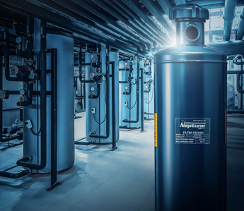Closed-loop systems in facility operations are designed to recirculate liquid in a loop while enhancing heat transfer and conserving water. In order for a liquid-recirculation system to be considered a true closed-loop system, it must lose less than 1% of the fluid it holds in one month. For example, a 1,000-gallon system can’t lose more than 10 gallons of fluid. However, there are a number of challenges that liquid-recirculation systems must solve in order to establish an actual closed-loop system.
Above all, closed-loop systems must ensure that heat-exchange properties are maintained to provide proper heat transfer while preventing internal damage from particulates, corrosion and fouling biological growth. The following operational factors increase these risks:

- Small flow orifices. The dirt and debris that clog the small flow orifices in heat exchangers can lead to an increased risk of corrosion and solids in the system.
- Water loss. Leaks and evaporation require introducing new water into the system, increasing the amount of oxygen, and therefore the potential for corrosion.
- Metallurgy. Several metallurgies – including iron, copper, brass, aluminum, stainless steel, nickel, galvanized steel – create different water conditions with varying corrosion rates.
- Pre-cleaning process. During the construction process, in a process called hydrotesting, water fills the system to verify pipe connections and joints are watertight. Flash rusting or corrosion can occur during the draining periods following hydrotesting.
Cartridge filters and bypass feeders perform adequately to filter systems. However, debris and solids drop to the bottom of the feeder causing complications when restarting the filtration. On the other hand, filter feeders – the next generation of filtration technology – combines the advantages of both methods to capture harmful contaminants and particulates while adding chemicals that can protect against corrosion.
Neptune® provides an ideal solution for closed-loop liquid-recirculation systems with its FTF Series Filter Feeder. Available in various models with capacities ranging from 2.5 to 7.5 gallons, the FTF Series Filter Feeder has been designed to introduce chemicals into hot-or-cold water systems while simultaneously filtering out contaminants as small as 1 micron in size. A quick-opening, high-pressure closure offers quality sealing with no tools needed. Finally, an extended neck with top inlet allows quick and easy installation of baskets and filter bags.
With the Neptune FTF Series Filter Feeder, closed-loop liquid-recirculation systems get closer to achieving the impossible – perfection.
To learn more, read the article:
How to Perfect Your Closed-Loop Systems.